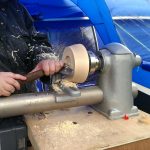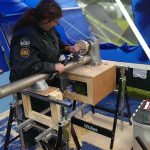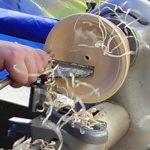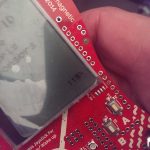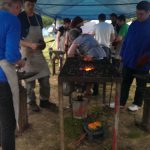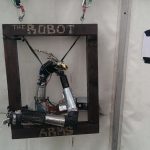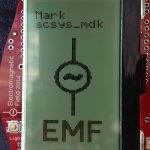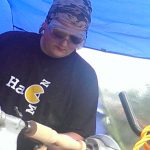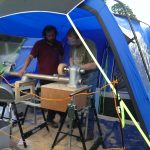Images from the 2014 EMF camp that LAMM attended with Manchester Hackspace (HacMan)
Month: December 2014
Education
The Space will have a number of electronic and manufacturing machines and as more are gained educational courses, training and practical hands-on training will be provided between, and for members. The plan would be to offer these services, access to the machines, and broader technological/manufacturing collaboration between the Space and educational establishments in the district. These will be performed via membership, open days and special ‘education’ days to promote small-scale fabrication.
The Space will also work strongly to promote STEM (Female representation in Science, Technology, Engineering and Mathematics) and build associations with organisations such as the WISE Campaign.
There is an increasing focus from the government to get more people, especially young people involved in Science and Engineering, hackerspace/maker ecology is particularly geared towards this as this article on the BBC news, from the ElectroMagnetic Field Camp in August 2014, discusses: http://www.bbc.co.uk/news/technology-29011889.
Industry as a Community Partner
Sole traders, Craft Traders, Micro-traders and Small enterprises do not usually have access to prototyping and electronic/digital fabrication machinery. The space will allow one-off usages, short memberships, or single item prototyping allowing small, new or innovative businesses to collaborate and innovate.
The Space will not compete economically on mass-produced items. However for smaller, agile, enterprises who need short-run, locally-accessible machinery for limited time periods it may represent a huge impact on their creative prowess and innovation strategy.
Hardware prototyping has been traditionally the largest stumbling block to the creation of a new product from smaller enterprises. A small digital fabrication shop with access to a varied array of tools, machinery and the knowledge and experience of its members may be the difference between a dream and a profitable enterprise.
Sole traders, craft suppliers and creative artists benefit particularly well from access to new fabrication process and machinery, but there is a benefit to established manufacturers and educational establishments from the input of the creative sector. Partnership between micro- and small-businesses, students and craft organisations is the focus of LICA at Lancaster University and LUMS.
A number of UK companies have already been formed from Community Hackspaces, such as Just Add Sharks, Folksy and Rattle Central. There is also the success of the Raspberry PI (UK designed and made) which is part of the Maker movement.
A Discussion on the Space: LAMM and LuneLab
(The views in the fiollowing article belong to the author and are not to be taken as wholly representative of the Lancaster and Morecambe Makers)
The Lancaster and Morecambe Makers are a group of local ‘technically minded’ and ‘craft-orientated’ people from Lancaster and Morecambe who wish to integrate their passion for open technology, collaboration and shared learning, within the wider community and educational environments.
There is already a local maker group based at Halton Mill called LuneLab (http://lunelab.org.uk/). This is a group that seeks to achieve many of the same aims, provide a local space to encourage making, crafting and collaboration. However there are important differences.
We are keen to focus on integrating the community and educational aspects of a Makerspace with the broader areas of companies, trade and industry. Our belief, and aim, is to foster an open environment for innovation, creation and commerce to broaden the community and create a sustainable environment that integrates business.
Makerspaces, and makers, broadly exist within the realm of Community Clubs, Membership Organisations; they are often not-for-profit organisations or community-led organisations. We intend to be managed as a not-for-profit to simplify the business focus of the organisation but that is where the similarity ends with the traditional club. We wish to have a stronger focus on the benefits of membership to small companies and sole traders. To show how using divergent technology, open technology and collaborative spaces can lead to innovation and generate new markets. We would also like to encourage interaction and collaboration with schools and colleges, other clubs and the wider community. There has been an increased focus from central government for the need to tie the relationships between these groups to achieve greater productivity and open opportunities.
Another distinction that can be made is that the LuneLab is not based within either Lancaster or Morecambe. LuneLab is run from Halton Mill, in Halton, near Lancaster and is part of the very noble sustainable ecology that exists around that area. We feel that a Lancaster ‘Space’ in a more central location, with on-site parking for trade and public users, nearby facilities and good transport links would help local trades and community groups more central to Lancaster. There is also the fact that the White Cross estate is a prominent business and technology park which complements our desire for industrial partnership.
LuneLab started mostly by the Lancaster CoHousing and Green Elephant organisations, as such part of its focus is on sustainability, alternative energy and recycling. These are admirable goals and again they are beliefs we share and encourage how ever we are attempting to foster only one ideology in the ‘Space’ which is a collaborative environment for open partnership.
Inside all of our serious, and somewhat formal, goals is the need to have fun and indulge in working with each other to build exciting projects and for sharing knowledge. An essential component in the success of Hackerspaces is the enthusiasm of the participants. We hope to encourage that enthusiasm; to increase links between what is notionally seen as hobbies/crafts and education; while at the same time provide opportunities for industry and commerce.
We have already spoken to the LuneLab and have identified that the Lancaster ‘Space’ will have a greater technological focus and the Halton ‘Space’ more geared towards crafts. However both ‘Spaces’ will offer a broad range of both and we want to work in partnership as well as with the broader communities. We are looking at ways of exploring and developing that partnership in 2015 and we will announce this as we work towards a cohesive plan.
Launching the “Space”
The Lancaster Space which will be the home of the newly-formed Lancaster and Morecambe Hackspace has been chosen and will be located in the centre of Lancaster at the White Cross Business Park.
At this time we are still in contract negotiation with the White Cross estate, but we have provisionally held a location and have secured funding for our first year’s rent.
A big thanks to Janet at White Cross, John-Pritam-Andrew at Lancaster County Council and Ruth also at LCC for their generous help and support so far.

